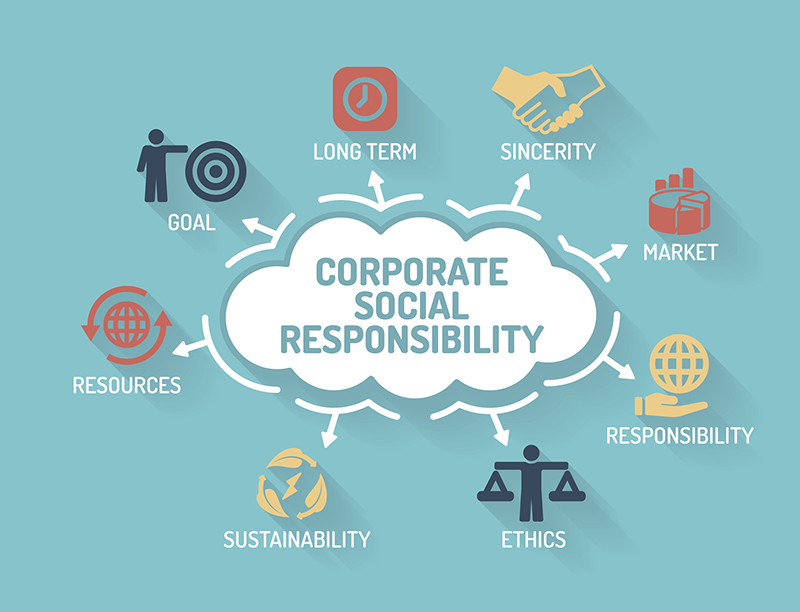Business Has a Conscience
As more companies embrace sustainability initiatives, CPAs find opportunities in doing good for the planet.
By Robert J. Derocher | Spring 2016

From its impressive 49,000 and 60,000-square-foot production and distribution facilities in a nondescript Itasca business park, Solberg Manufacturing’s 150 employees are hard at work making specialty equipment filters and vacuum products for worldwide distribution. They’re also hard at work generating 50 pounds of compost per week; using corn-based foam for packaging; earning paid time off for donating blood; and growing kale, Brussels sprouts and native prairie plants in the back of the facility.
“We do it because it’s the right thing to do. It’s the right way to behave. It’s common sense,” says the company’s President Tor Solberg. “It’s a terrific journey; it improves the company and ourselves.”
Solberg Manufacturing is not alone in championing the corporate social responsibility (CSR) movement. Each year, more and more companies embrace sustainability reporting initiatives. Between 1999 and 2014, in fact, worldwide companies issuing CSR reports skyrocketed from about 750 to more than 7,800, says CSR tracker
CorporateRegister.com. Those numbers pretty well prove that CSR reports are no longer just feel-good, throwaway corporate documents; rather, they're an increasingly significant piece of investor and consumer intelligence.
With CSR reporting dating back to the 1960s, the authorities, frameworks, guidelines and terminology guiding its practice have changed several times over, adding layers of confusion and complexity to the process along the way.
“There are important distinctions to make in the descriptions,” explains Hank Boerner, chairman of the
Governance & Accountability Institute, a firm that advises corporations and the investment community in matters of corporate sustainability data, research and analysis. “The current favorite of institutional investors is ESG, which considers a company’s performance in environmental and energy management (E), societal issue concerns (S) and governance (G), with ‘sustainability’ as shorthand. To companies, corporate social responsibility often means community affairs, philanthropy, giving, support for education, and so forth. The ‘sustainability’ framing is much broader and deeper and involves financial considerations.”
And, in fact, those financial considerations are motivating many companies to turn their non-binding good thoughts into essential business requirements, says Louis Coppola, the Institute’s co-founder and executive vice president.
“The pitfall of not reporting on ESG is that you get a zero on all the ratings, rankings and investor data,” he says. “You will be increasingly penalized by investors, customers and employees. You will have a harder time getting a license to operate in a new country, or build a factory, or launch a new product. You will be passed over for your competitors when investors and customers weigh sustainability into their decision-making—which is happening at an exponential pace.”
“Many companies have supply chain requirements, so this trend gets passed down to smaller companies, too. So now you’ve got small and medium-sized companies being pulled into sustainability reporting,” says Levi Stewart, CPA, sector analyst for the
Sustainability Accounting Standards Board (SASB), a nonprofit group that works with public companies on sustainability accounting issues.
While more companies are realizing the business importance of CSR and sustainability reporting, Harrison Thomas, SASB’s products and partnership manager, points out that there’s often confusion about how to develop and disseminate the information. In answer to this challenge, the SASB launched its Fundamentals of Sustainability Accounting (FSA) credential last year. More than 20 subject matter experts with experience in sustainability, accounting, finance and law weighed in on the development of the credential, which distinguishes professionals who understand the link between material sustainability information and a company’s financial performance.
By now you’re probably asking what this all means for CPAs. The answer, in a word, is opportunity.
As demand grows for CSR and sustainability reports that stretch beyond the basics, CPAs are being called on to audit, evaluate, interpret and even help to create these increasingly influential business documents.
“Accountants will be surprised at how integral accounting is to the sustainability movement,” Stewart explains. “This is an emerging market that the Big Four haven’t necessarily cornered. Smaller firms definitely have opportunities open to them.”
CPAs—particularly those with strong auditing chops—are well-positioned to take on significant CSR and sustainability roles as an increasing number of companies seek verification of their reporting, says Gregory Jonas, associate professor of accounting at Case Western Reserve University’s Weatherhead School of Management.
“The assurance arena can provide the biggest opportunities for CPAs,” he explains. “Now, more than ever, you have quantified sustainability information. What’s the difference between auditing financials and auditing these quantifiable metrics? There are lots of opportunities for CPAs to add value.”
Increasing global trade is likely to boost accounting needs even further, particularly when you consider that European nations and companies are well ahead of their US counterparts in CSR and sustainability reporting, and therefore demand a high level of documentation.
Whichever way you look at it, it’s obvious that, “CSR is here to stay,” says Jonas. And in a profession where niche knowledge is often king, the possibilities for CPAs are endless.